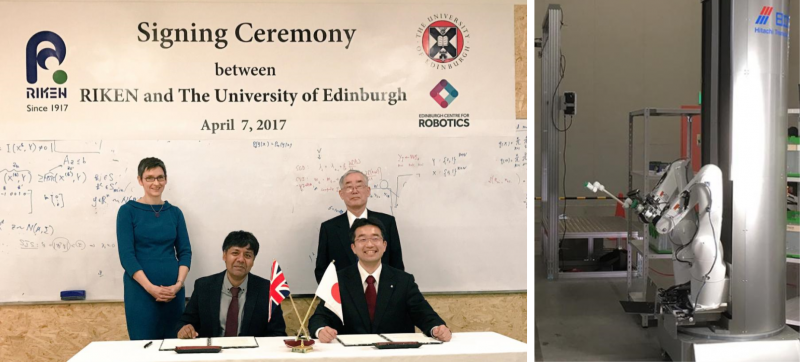Smart Robots for Intelligent Warehousing: from Research to Translation
Researchers from Statistical Machine Learning and Motor Control Group have recently received boost in funding from various sources to further their study on novel solutions for automated supermarkets and warehouses.
Three grants awarded to the group will support the work to tackle challenges in dynamic motion planning in pick and place tasks in such cluttered environments.
SLMC scientists led by Professor Sethu Vijayakumar have produced world-leading solutions to these challenges through the release of the Exotica Planning software and the inverse Dynamic Reachability Map based plan representations and adaptation control algorithms - the same technology that is used on the NASA Valkyrie project.
The following projects look at expanding this research as well as translating some of these solutions to real world applications in warehousing, robot co-working and factories.
The group received £119,000 of funding for the DST-UKIERI joint project with IIT-Kanpur, India titled ‘Learning Robotic Motor Skills, Visual Control and Perception for Warehouse Automation’. It’s a three year project started in April 2017 for core research into improving robustness of warehousing solutions with one of leading research institutions in India.
Professor Vijayakumar will also be working with industrial partners: DFKI Germany, COMAU-Italy, Fraunhofer, CRF and Fortiss, to research technologies for pilot deployment in automated supermarkets. This one-year project started in January 2017, entitled 'iLEVATOR: intraLogistics Enabled by autonomous Vehicles cooperATing with Operators and Robots' is funded by EiT Digital.
Finally, the group has just completed a second phase of the Hitachi funded translation project on 'Motion Planning for Intelligent Warehousing Solutions', deploying the Edinburgh Exotica Motion planning library in realistic warehouse testing at the outskirts of Tokyo. Plans are in progress to start the third phase of the project.
A new collaboration agreement under the auspices of the British High Commission in Tokyo was signed by the University of Edinburgh and the newly established RIKEN Centre for Advanced Intelligence Project (AIP) that will also help progressing the research in the area. RIKEN is a premier Japanese Research and Development Centre that celebrates its centenary this year. The agreement will help facilitate cooperation in the fields of machine learning and robotics research, through exchange of interns and visiting faculty.


